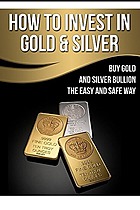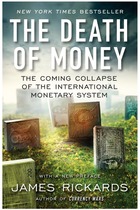
Gold
Gold has been prized for centuries as a store of value, a form of currency and a symbol of wealth. One of history’s most enduring commodities, gold has long been considered as the world's safe-haven metal due to its enduring appeal and historical significance. Gold has a key role as a strategic long-term investment and as a mainstay allocation in a well-diversified portfolio. From its role in providing economic stability to its ability to act as a hedge against inflation, gold has proven its worth as a resilient and trusted asset.
Experts - People
Adam Baratta
Adam Kobeissi
Alan Greenspan
Alex Gurevich
Amine Bouchentouf
Amir Adnani
Andrew Maguire
Andy Schectman
Axel Merk
Bart Melek
Ben Davies
Bill Fleckenstein
Bill Shaw
Bob Coleman
Bob Moriarty
Byron King
Carlos Sanchez
Chris Powell
Clint Cox
Dan Oliver Jr.
Daniel Earle
Dave Forest
David Morgan
Dominic Frisby
Doug Eberhardt
Doyle Shuler
EB Tucker
Egon von Greyerz
Eric Muschinski
Frank Giustra
Garrett Goggin
George Milling-Stanley
Greg Weldon
Gregory Crouch
Guy Adami
Hunter Riley III
James DiGeorgia
James Turk
Jamie Strauss
Jason Hamlin
Jeff Clark
Jeff Currie
Jeffrey Christian
Jim Bianco
Jim Grant
Jim Sinclair
Joe Cavatoni
John Butler
John Doody
John Embry
John Hathaway
Josh Crumb
Judy Shelton
Keith Dicker
Keith Neumeyer
Keith Weiner
Kirill Zagalsky
Kristen Capuano
Larry Lepard
Lobo Tiggre
Marc Faber
Maria Smirnova
Marin Katusa
Mark Chalmers
Mark Hulbert
Mark Valek
Mark Yaxley
Martin Armstrong
Matthew Carr
Matthew Hart
Mike Maloney
Ned Naylor-Leyland
Nico Marais
Peter Schiff
Philip Haydn-Slater
Pierre Lassonde
Randy Smallwood
Randy Swan
Rhona O'Connell
Rick Rule
Rob McEwen
Ron Paul
Ron Thiessen
Ronan Manly
Ross Beaty
Roy Sebag
Russell Lamberti
Sam Sommer
Sean Brodrick
Simon Mikhailovich
Stefan Spears
Steve Saville
Thomas Kaplan
Todd Edgar
Tom Denham
Trace Mayer
Trey Reik
Willem Middelkoop
REASONS TO INVEST IN GOLD
Economic Stability.
In the unpredictable world of finance, where market fluctuations and economic crises can strike without warning, gold has long been a symbol of stability and financial security.
Inflation Protection.
Gold is a proven hedge against inflation as it is said to preserve the real value of assets when other prices rise. Gold stands as a steadfast guardian against this monetary threat.
Diversification Benefits.
Gold offers diversification benefits due to its low correlation with other assets, such as stocks, shares and bonds. When the values of traditional investments fluctuate, gold often moves in the opposite direction.
Crisis Resilience.
Throughout history, gold has consistently demonstrated its ability to withstand crises and when geopolitical tensions escalate or financial markets become turbulent, investors often seek refuge in gold as a safe haven.
Global Demand.
Gold’s enduring allure as a safe-haven asset is further bolstered by its global demand and diverse uses. The investment demand for gold remains robust as investors worldwide recognise its role in preserving wealth and often choose to include it in their portfolios.
Stick to standardized investments.
You can buy gold coins, jewelry and other collectibles in many ways. But as a pure investment, it is best to stick to standardized options with a predetermined amount of gold content.
Buying from reputable dealers.
Buying gold directly from a dealer, either online or in person, is safer. Be sure to check each dealer’s reputation and history of customer complaints through services like the Better Business Bureau.
Consider gold stocks and funds for liquidity.
Gold stocks, ETFs and mutual funds are much easier to buy and sell than physical gold. You can make these trades immediately through your brokerage account.
Use a precious metal IRA for tax savings.
A precious metal individual retirement account, or IRA, lets you buy and store your retirement savings in physical gold.
Let someone you trust know about hidden gold.
Let someone you trust know about the investment and hiding place. That way, if you pass away suddenly, your loved ones don’t lose the gold hidden inside a sofa or under a floorboard.
Consult with a financial advisor.
Before changing up your investment portfolio, consider meeting with a financial advisor first. They can give you an unbiased opinion of gold as an investment.
Hedge against inflation.
During periods of high inflation, the dollar price of gold could increase and deliver a higher return to investors. Investor demand also could rise as people move their cash into physical assets to prevent further losses from inflation.
Protection against market downturns.
Gold can be a safe-haven asset. Investors often buy gold to protect their savings in the event of a market crash.
Some investors buy gold or buy silver as a way to build a diverse portfolio. Rather than having all of your money tied up in one asset class, different types of investments could potentially help you better manage risk and return.
Does not generate income.
The only way to make money investing in gold is if the price goes up. There is no stream of income associated with the investment.
Extra costs.
There are often extra costs associated with owning and storing gold. These are extra costs that reduce your overall return.
If you sell physical gold for more than you paid, you will owe capital gains on the profit.







































































































































































































